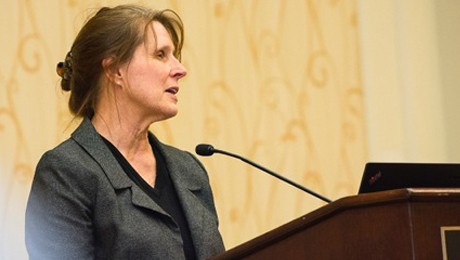
Marcie Pitt-Catsouphes presents the keynote at the 2015 SSWR annual meeting (photo courtesy Alexander Aleman).
This year’s Society for Social Work and Research (SSWR) Annual Meeting was the biggest ever: More than 1,600 in the field descended upon New Orleans, Louisiana for presentations and conversations around the theme of the “Social and Behavioral Importance of Increased Longevity.”
The opening keynote address was given by two professors who have devoted their careers to this theme — BC Social Work’s Marcie Pitt-Catsouphes and Nancy Morrow-Howell of Washington University in St. Louis. The two thought leaders did not disappoint, wowing those in attendance. “It was truly one of the strongest presentations I’ve ever witnessed at any conference,” said Dean Alberto Godenzi.
Entitled “Taking Advantage of Increased Longevity: Work and Productive Engagement,” the Pitt-Catsouphes and Morrow-Howell talk explored current trends for productive engagement in the later years of life now being experienced by those of the famed Baby Boomer generation.
Pitt-Catsouphes and Morrow-Howell asked their audience to keep four principal points in mind during their presentation:
- Longevity is a game changer. Not only do we live longer, but those extra years are often accompanied by reasonably good health. For this reason, the impact on society of growing older has become much more profound than in the recent past.
- Aging is relevant to everyone. Social work researchers need to remember this, whether the focus of their research is placed on older adults and the elderly or not – because aging is a lifelong process and is relevant to people of all ages. Simply put: what we do earlier in life and the experiences we have will affect the quality of life and the choices have later in life as well.
- Demographic changes are important, but they’re really just the tip of the iceberg when it comes to understanding aging. Research must incorporate an understanding of factors such as: shifts in economics over the life course, trends in health and well being, the emergence of new programs and practices for older adults and their families, and the articulation of new cultural expectations about what aging can, and perhaps should, be.
- A critical 21st century challenge for social work researchers is to address the growing structural lag between the changing needs of contemporary old adults and the institutional resources that currently exist.
In addition to Pitt-Catsouphes’ presentation, Boston College Social Work was well represented at SSWR. More than 20 professors and PhD students presented on a wide range of topics, from neuroscience and social work, to sustaining livelihoods for refugees in South Africa, to the social and behavioral importance of African-American fathers, to name just a few.
We encourage you to learn more about all of the groundbreaking work being done on aging at Boston College’s Center on Aging and Work.

